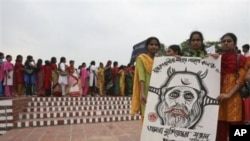The United Nations has put women at the center of its 2010 State of the World Population report, which says rape is increasingly used as a weapon of war.
The U.N. State of the World Population Report coincides with the 10 year anniversary of U.N. Resolution 1325, which aims to make women central to building peace in conflict situations.
U.N. Population Fund humanitarian response chief Jemilah Mahmood says when women suffer discrimination they are vulnerable in conflict situations and are less able to help with recovery.
"When women enjoy rights and opportunities they are more resilient to disaster and conflict," said Mahmood. "And investing in health care, education, and social development will build people's resilience in times of extreme vulnerability."
The U.N. report highlights countries in which women are empowered to heal wounds in their country. Bosnia and Herzegovina, Haiti, Iraq, Jordan, Liberia, the Occupied Palestinian Territory, Timor-Leste and Uganda are named.
Mahmoud says Liberia shows how women's rights have moved forward in the past decade.
"Liberia is a very good example of where women's empowerment has led to special courts being organized in Liberia that will address gender-based violence and magistrates being trained to address specific issues of protections of witnesses and survivors of gender-based issues," added Mahmood.
Resolution 1325 calls for the equal participation and full involvement of women in efforts to build peace.
International Action Network on Small Arms Program Officer Nounou Booto Meeti says Resolution 1325 cannot bring change if it is not properly implemented.
"For the past 10 years you can actually see that not even half of member states at the United Nations have the national action plan on 1325," said Meeti. "So I think the implementation has been very poor in terms of implementing 1325 on the ground."
Booto Meeti is from the Democratic Republic of Congo, where women are regularly victims of rape in the eastern part of the country.
In August, more than 200 women were raped during the course of four days by members of three militia groups in eastern Congo.
Two months later it was reported that U.N.-backed Congolese troops had carried out further rapes in the same area.
Booto Meeti says Resolution 1325 needs to be used to end the atrocities against women in her country.
"Today, Bukavu the eastern part of Eastern DRC is being called the capital of rape because there is no control, and we can see that there is no effectiveness of 1325 on the ground," added Metti.
The head of the U.N. force in Congo said last week more than 15,000 rapes were committed last year in the country.




